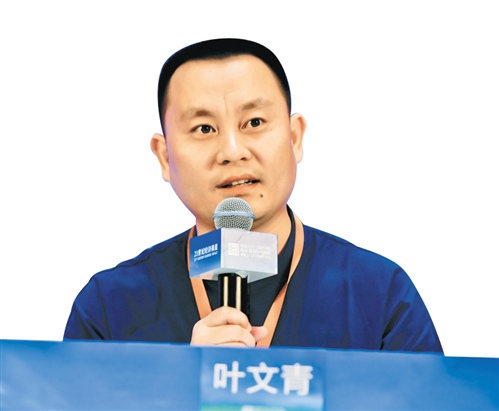The shift in the real estate sector is not only influencing developers' business strategies, but also presenting significant challenges to the growth of support service providers within the industry chain. At the 17th annual meeting of the Boao 21st Century Real Estate Forum, Ye Wenqing, Deputy General Manager of Midea Group's Strategic Customer Department and Director of Central Air Conditioning Real Estate Projects, emphasized that for many cities with high supply-demand ratios, particularly in fourth-tier cities where inventory backlog issues are severe, the next three years may see "how to address stock" becoming a pressing economic and livelihood issue that cannot be ignored.
Ye Wenqing noted that promoting property market destocking can be approached by enhancing cost-effectiveness and creating differentiated advantages. Real estate supporting projects have long been a key business line for Midea's central air conditioning. In his view, hardworking rooms have become a mainstream trend due to their differentiated advantages and high cost-performance ratio. Thus, in the future, real estate developments will increasingly incorporate hard furnishings and home appliances.

Ye Wenqing mentioned that Midea has already aligned itself with the trend of hardcover housing, providing comprehensive solutions including air conditioning, hot water, heating, fresh air, lighting, and smart kitchen appliances. The ongoing adjustments in the property market, which began last September, have undergone multiple rounds of policy interventions. Currently, the property market in first-tier cities is showing signs of cooling.
As such, Ye Wenqing informed reporters that the current real estate adjustments pose both challenges and opportunities for the industry or the central air conditioning sector. Firstly, the adjusted market will experience intensified competition, with developers demanding higher-quality products and services while enforcing stricter cost controls. Secondly, to overcome these challenges, enterprises must enhance their competitiveness through technological, quality, or service upgrades, thereby driving rapid industry growth.
The U.S. central air conditioning response strategy involves strengthening risk resistance capabilities from the perspectives of technology, efficiency, and cost. Specifically, Midea has been actively promoting innovative developments in refrigeration and energy-saving technologies. According to Ye Wenqing, in 2016, Midea's R&D investment in central air conditioners accounted for 4% of annual sales, compared to 3% for the entire home appliance industry. He emphasized that Midea will continue to increase its R&D investment, aiming for 5% of annual sales by 2017.
"Many of our current products have reached international leading levels in energy efficiency, and intelligent control systems allow us to design environmental solutions for various buildings," Ye Wenqing told the 21st Century Business Herald. Midea's Central Air Conditioning Division has been focusing on intelligence, and the Group's subsidiaries have established a Smart Home Division to integrate all products into smart home solutions."
Additionally, Midea has collaborated with major housing companies like Vanke and Country Garden on smart homes, integrating original smart home networks into housing development projects.
In terms of efficiency, Midea's central air conditioning operates out of three production bases in Shunde, Chongqing, and Hefei, with a production capacity of 20 billion yuan. Large-scale production undoubtedly reduces the per-unit production cost. Moreover, Midea's central air conditioning has fully automated its production processes, with a current man-machine ratio of 40% at Midea's central air conditioning plants.
Regarding cost research, Midea adopts a centralized supporting model to achieve direct supply from manufacturers to developers, eliminating the repetitive work of consulting, bidding, and coordinating between different suppliers or contractors for various projects, thus reducing intermediary costs. Furthermore, the company's "bulk purchasing mode," which has been implemented over the years, has enabled significant savings in intermediate procurement costs.
The so-called "bulk purchasing mode" allows Midea's central air conditioning division to sign large-scale purchase agreements with real estate developers. Developers can place orders with Midea branches nationwide at any time, leveraging the 36 branches across the country for supply and service.
Ye Wenqing told reporters that this bulk purchasing mode offers several advantages: First, it secures the most favorable pricing policies through large-scale procurement; secondly, it simplifies the developer's procurement process and reduces management costs; third, it streamlines the procurement process, ensuring faster factory supply and saving installation time. Fourth, it provides access to nationwide pre-sales, sales, and after-sales services.
According to reports, Midea's central air conditioning division has 36 branches, over 3,500 dealers, and more than 3,000 service providers nationwide.
Midea's central air conditioning research found that the four factors of product, technology, cost, and service directly impact real estate sales and profits, which are also critical considerations for real estate developers.
According to Ye Wenqing, in terms of product categories, Midea Central Air Conditioning can provide corresponding supporting products for small-sized houses, villas, and even large-scale shopping malls and hotels, including central air conditioning systems to hot water systems, personalized products. In the construction of characteristic towns that housing companies are actively deploying, Midea can also provide appropriate product matches.
Industry monitoring data shows that in 2016, Midea's central air conditioning annual sales reached 13.71 billion yuan, with a market share of 18.52%, 2.5 percentage points ahead of the second place, ranking first in the industry for four consecutive years.
Ye Wenqing told reporters that sales in the first half of this year reached 9.6 billion yuan, a year-on-year increase of 29%, with an annual target to grow by more than 30%.
For the sales channel, Ye Wenqing said that the company's online and offline layouts are relatively complete, with both channels complementing each other effectively. Currently, there are specialty stores in county-level towns, with over 4,000 specialty stores nationwide for central air conditioning, significantly boosting growth this year.
[Extended reading]
- Home central air conditioning down-penetration files upgrade multi-party forces
Used Hasee Laptops,Hasee Laptop,Hasee Gaming Laptop,Hasee Laptop Price
Guangzhou Panda Electronic Technology Co., LTD , https://www.panda-3c.com